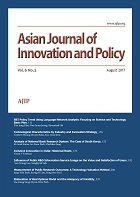 ISSN : 2287-1608
ISSN : 2287-1608
Forecasting Korean National Innovation System and Science & Technology Policy after the COVID-19
Ki-Seok Kwon
Abstract
The COVID-19 is a pandemic that affects all facets of our life and will change many patterns in science technology and innovation. A qualitative study was conducted using Focus Group Interview involving ten industry-academia-research experts with the objective of identifying changes in Korea’s national innovation system and science & technology policy after the COVID-19. Eight questions were designed, based on the major components of the national innovation system, such as companies, universities, and research institutes, to discuss the changes in the national innovation system and science & technology policy. Also, keyword analysis and cluster analysis were performed using the network analysis program VOSviewer. It is predicted that, in the wake of the COVID-19, Korea’s national innovation system will shift to a new paradigm that is more decentralized, responsive, and autonomous. Furthermore, several policy agendas that can turn these changes into positive momentum of change in science & technology policy are presented.
- keywords
- COVID-19, Focus Group Interview, national innovation system, S&T policy, keyword analysis
Reference
Bloor M, Frankland J, Thomas M. and Robson K. (2001) Focus groups in social research. London: Sage Publications.
Cyr, J. (2015) The Pitfalls and Promise of Focus Groups as a Data Collection Method, Sociological Methods and Research, 45(2), pp. 231-259. https://doi.org/10.1177/ 0049124115570065
Freeman, C. (1987), Technology Policy and Economic Performance: Lessons from Japan, Pinter.
Gill, P., Stewart, K., Treasure, E. and Chadwick, B. (2008) Methods of data collection in qualitative research: Interviews and focus groups, British Dental Journal, 204(6), 291-295.
Greenwood, M., Kendrick, T., Davies, H., Gill, F.J. (2017) Hearing voices: Comparing two methods for analysis of focus group data, Applied Nursing Research, 35, 90-93.
Hyde, A., Howlett, E., Brady, D., Drennan, J. (2005) The focus group method: Insights from focus group interviews on sexual health with adolescents, Social Science and Medicine, 61(12), pp. 2588-2599. https://doi.org/10.1016/j.socscimed.2005.04.040
Krueger R.A. (1998) Moderating focus groups. London: Sage Publications.
Kruger, R.A. and Casey, M.A (2000) Focus Groups: A Practical Guide for Applied Research, 3rd ed., Thousand Oaks: Sage Publications.
Kwak, K.Y. (2014), Analysis in Social Network, ChungLam Publishing.
Laestadius, L.I., Penndorf, K.E., Seidl, M. and Cho, Y.I. (2019) Assessing the appeal of Instagram electronic cigarette refill liquid promotions and warnings among young adults: Mixed methods focus group study, Journal of Medical Internet Research, 21(11), e15441.
Lee, J.H. (2020), An Analysis of Issues of Development and Supply of Antibody Drug and Vaccine of the COVID-19, KHIDI Brief Vol. 308.
Lundvall, B. (1992), “National Innovation Systems: Towards a Theory of Innovation and Interactive Learning,” Pinter.
Ministry of Science and ICT (2020), COVID-19 MIST policy, https://www.msit.go.kr/ web/msipContents/contents.do?mId=NTI4
Moon, Y.H. and Seol, S.S. (2017), Evaluation of the theory on the 4th Industrial Revolution, Asian Journal of Innovation and Policy, 6-3, 245-261.
Morgan D.L. (1998), The Focus Group Guide Book. London: Sage Publications.
Nelson, R.R. (1993), National Innovation Systems: A Comparative Study, Oxford University.
Park. S.U. (2020), Super Computer Power Initiative for Infectious Disease Response, KISTEP Issue Paper 2020-04.
Rosenthal, M. (2016), Qualitative research methods: Why, when, and how to conduct interviews and focus groups in pharmacy research, Currents in Pharmacy Teaching and Learning, 8(4), pp. 509-516.
Seol, S.S. and Ko, C.R (2020 forthcoming), Lessons from Korean response to the COVID-19: missing factors of sectoral innovation system, Asian Journal of Innovation and Policy.
Stewart D W, Shamdasani P.M. (1990), Focus groups. Theory and practice. London: Sage Publications.
Yoon, S.M. (2018), Efficient Promotion Plan of Daejeon Science Festival, Daejeon Sejong Research Institute, Policy Research 2018-43.
- Downloaded
- Viewed
- 0KCI Citations
- 0WOS Citations

